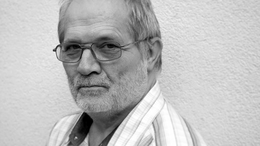Love and Other Demons
| Love and Other Demons | |
|---|---|
| Opera by Péter Eötvös | |
 Eötvös in 2018 | |
| Librettist | Kornél Hamvai |
| Language |
|
| Based on | Of Love and Other Demons by Gabriel García Márquez |
| Premiere | 10 August 2008 |
Love and Other Demons is an opera in two acts by Hungarian composer Péter Eötvös to a libretto by the Hungarian author Kornél Hamvai. It premiered on 10 August 2008 at the Glyndebourne Festival. The libretto is based on the novel Of Love and Other Demons (1994) by Gabriel García Márquez. The opera is the result of a commission by Glyndebourne and the BBC; it was broadcast in full on BBC Radio 3 on Saturday, 11 October 2008.
Plot[edit]
Maria is living with her father who is not taking care of her. She prefers to be with the servants and slaves. She is bitten by a dog with rabies. She suffers no reaction; nevertheless, she is brought to a convent where Father Delaura is supposed to take care of her. He is supposed to exorcise her of demons but falls in love with her. As this is recognized she is removed from the convent and the bishop himself will exorcise her demons. She dies in the process.
Roles[edit]
| Role | Voice type | Premiere cast, 10 August 2008 Conductor: Vladimir Jurowski[1] |
|---|---|---|
| Sierva Maria | soprano | Allison Bell |
| Don Ygnacio, a marquis and father of Maria |
tenor | Robert Brubaker |
| Father Cayetano Delaura | baritone | Nathan Gunn |
| Abrenuncio, a doctor |
tenor | John Graham-Hall |
| Don Toribio, the bishop |
bass | Mats Almgren |
| Dominga de Adviento, a servant woman |
mezzo-soprano | Marietta Simpson |
| Josefa Miranda, the abbess |
mezzo-soprano | Felicity Palmer |
| Martina Laborde, an insane woman |
mezzo-soprano | Jean Rigby |
| Orchestra | London Philharmonic Orchestra | |
| Director | Silviu Purcărete | |
| Dramaturgy | Edward Kemp | |
| Costume and lighting design | Helmut Stürmer | |
| Video projection | Andu Dumitrescu | |
| Chorus Chorus master |
The Glyndebourne Chorus Thomas Blunt | |
At Glyndebourne, the performance lasted for 3 hours 50 minutes, including a 1-hour 20 minutes interval. The staging is a co-production with the Lithuanian National Opera and Ballet Theatre.
Instrumentation[edit]
The instrumentation calls for:
- Woodwinds: 2 flutes (both also doubling on piccolo, second also on alto flute, 2 oboes, 2 clarinets, 1 bass clarinet, saxophone (soprano, alto, baritone), 2 bassoons (second doubling on contrabassoon)
- Brass: 4 horns, 2 trumpets, 2 trombones, 1 tuba
- Percussion (for 2 players): glockenspiel, crotales, marimba, tubular bells, 3 gongs, cow bells, triangle, cymbals (medium and low), sizzle cymbals, sleighbells (high and loud, 3–4 exotic types, of special sound colour), tam-tam (low), anvil, tambourine, bass drum, wood blocks (really high), African beans rattle, timpani, vibraphone, cencerros (really high), maracas
- harp, celesta, strings (12 · 0 · 8 · 6 · 4 (2 with 5 strings))
Comments[edit]
Unusually, Love and Other Demons consistently uses multiple languages. The different levels of narration and action in the story have their own characteristic language: English is the 'everyday language' of the noblemen, Latin is the language of the church rites, Spanish is used by Delaura whenever his conversations with Sierva touch on personal feelings, and Yoruba is the 'secret' language of the slaves.
Reception[edit]
The Glyndebourne performance of Love and Other Demons was awarded four out of five stars by Andrew Clements of The Guardian, who stated that “if structurally it is his most conventional [opera] so far, it is also well made and musically rewarding.” Clements criticized Hamvai's libretto, writing that the removal of the 18th century Latin American context neutralizes “the power of Márquez's magic realism”. However, Clements also argued that Eötvös's score “is full of authentically magical things. His orchestral imagination is keen and he has simplified his musical language without ever making it simplistic. There are ravishing sounds here, combined with equally convincing vocal writing often spun over diaphanous textures, even though sometimes the drama needs more of a musical push.”[2]
German production, 2009[edit]
The first German production was presented on 31 January 2009 at the Chemnitz Opera under the direction of Dietrich Hilsdorf and with Julia Bauer in the role of Maria.[3]
References[edit]
- ^ "Creative Team and Cast Members". Glyndebourne Festival Opera. 2008. Archived from the original on 20 July 2008. Retrieved 4 August 2008.
- ^ Clements, Andrew (11 August 2008). "Opera review: Love and Other Demons, Glyndebourne". The Guardian. ISSN 0261-3077. Retrieved 12 November 2019.
- ^ Chemnitz Opera announcement[permanent dead link]
